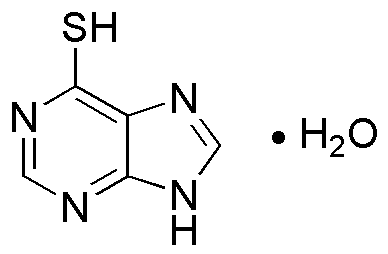6-Mercaptopurine monohydrate is widely utilized in research focused on:
- Oncology Treatments: This compound is primarily used in chemotherapy for treating leukemia and other cancers, helping to inhibit the growth of cancer cells.
- Immunosuppressive Therapy: It plays a crucial role in managing autoimmune diseases by suppressing the immune response, making it valuable in organ transplantation.
- Research in Biochemistry: Researchers use it to study purine metabolism and the effects of thiopurines on cellular processes, contributing to advancements in genetic research.
- Pharmaceutical Development: Its properties are explored in the development of new drugs, particularly in creating more effective treatments with fewer side effects.
- Veterinary Medicine: 6-Mercaptopurine monohydrate is also applied in veterinary practices for treating certain cancers in animals, showcasing its versatility across species.
Informations générales
Propriétés
Sécurité et réglementation
Applications
6-Mercaptopurine monohydrate is widely utilized in research focused on:
- Oncology Treatments: This compound is primarily used in chemotherapy for treating leukemia and other cancers, helping to inhibit the growth of cancer cells.
- Immunosuppressive Therapy: It plays a crucial role in managing autoimmune diseases by suppressing the immune response, making it valuable in organ transplantation.
- Research in Biochemistry: Researchers use it to study purine metabolism and the effects of thiopurines on cellular processes, contributing to advancements in genetic research.
- Pharmaceutical Development: Its properties are explored in the development of new drugs, particularly in creating more effective treatments with fewer side effects.
- Veterinary Medicine: 6-Mercaptopurine monohydrate is also applied in veterinary practices for treating certain cancers in animals, showcasing its versatility across species.
Documents
Fiches de données de sécurité (FDS)
La FDS fournit des informations de sécurité complètes sur la manipulation, le stockage et l’élimination du produit.
Spécifications du produit (PS)
Le PS fournit une description complète des propriétés du produit, notamment sa composition chimique, son état physique, sa pureté et les exigences de stockage. Il détaille également les plages de qualité acceptables et les applications prévues du produit.
Certificats d'analyse (COA)
Recherchez des certificats d'analyse (COA) en saisissant le numéro de lot du produit. Les numéros de lot et de lot se trouvent sur l'étiquette d'un produit, après les mots « Lot » ou « Lot de fabrication ».
Numéro de catalogue
Numéro de lot/série
Certificats d'origine (COO)
Ce certificat d'exploitation confirme le pays dans lequel le produit a été fabriqué, et détaille également les matériaux et composants utilisés et s'il est issu de sources naturelles, synthétiques ou autres sources spécifiques. Ce certificat peut être requis pour les douanes, le commerce et la conformité réglementaire.
Numéro de catalogue
Numéro de lot/série
Fiches de données de sécurité (FDS)
La FDS fournit des informations de sécurité complètes sur la manipulation, le stockage et l’élimination du produit.
DownloadSpécifications du produit (PS)
Le PS fournit une description complète des propriétés du produit, notamment sa composition chimique, son état physique, sa pureté et les exigences de stockage. Il détaille également les plages de qualité acceptables et les applications prévues du produit.
DownloadCertificats d'analyse (COA)
Recherchez des certificats d'analyse (COA) en saisissant le numéro de lot du produit. Les numéros de lot et de lot se trouvent sur l'étiquette d'un produit, après les mots « Lot » ou « Lot de fabrication ».
Numéro de catalogue
Numéro de lot/série
Certificats d'origine (COO)
Ce certificat d'exploitation confirme le pays dans lequel le produit a été fabriqué, et détaille également les matériaux et composants utilisés et s'il est issu de sources naturelles, synthétiques ou autres sources spécifiques. Ce certificat peut être requis pour les douanes, le commerce et la conformité réglementaire.


